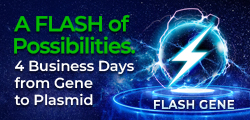-
REAGENT SERVICES
Hot!
-
Most Popular Services
-
Molecular Biology
-
Recombinant Antibody/Protein
-
Reagent Antibody
-
CRISPR Gene Editing
-
DNA Mutant Library
-
IVT RNA and LNP Formulations
-
Oligo Synthesis
-
Peptides
-
Cell Engineering
-
- Gene Synthesis FLASH Gene
- GenBrick™ Up to 200kb
- Gene Fragments Up to 3kb now
- Plasmid DNA Preparation Upgraded
- Cloning and Subcloning
- ORF cDNA Clones
- mRNA Plasmid Solutions New!
- Cell free mRNA Template New!
- AAV Plasmid Solutions New!
- Mutagenesis
- GenCircle™ Double-Stranded DNA New!
- GenSmart™ Online Tools
-
-
PRODUCTS
-
Most Popular Reagents
-
 Instruments
Instruments
-
Antibodies
-
ELISA Kits
-
Protein Electrophoresis and Blotting
-
Protein and Antibody Purification
-
Recombinant Proteins
-
Molecular Biology
-
Stable Cell Lines
-
Cell Isolation and Activation
-
 IVD Raw Materials
IVD Raw Materials
-
 Therapy Applications
Therapy Applications
-
Resources
-
- All Instruments
- Automated Protein and Antibody Purification SystemNew!
- Automated Plasmid MaxiprepHot!
- Automated Plasmid/Protein/Antibody Mini-scale Purification
- eBlot™ Protein Transfer System
- eStain™ Protein Staining System
- eZwest™ Lite Automated Western Blotting Device
- CytoSinct™ 1000 Cell Isolation Instrument
-
- Pharmacokinetics and Immunogenicity ELISA Kits
- Viral Titration QC ELISA Kits
- -- Lentivirus Titer p24 ELISA KitHot!
- -- MuLV Titer p30 ELISA KitNew!
- -- AAV2 and AAVX Titer Capsid ELISA Kits
- Residual Detection ELISA Kits
- -- T7 RNA Polymerase ELISA KitNew!
- -- BSA ELISA Kit, 2G
- -- Cas9 ELISA KitHot!
- -- Protein A ELISA KitHot!
- -- His tagged protein detection & purification
- dsRNA ELISA Kit
- Endonuclease ELISA Kit
- COVID-19 Detection cPass™ Technology Kits
-
- Automated Maxi-Plasmid PurificationHot!
- Automated Mini-Plasmid PurificationNew!
- PCR Reagents
- S.marcescens Nuclease Benz-Neburase™
- DNA Assembly GenBuilder™
- Cas9 / Cas12a / Cas13a Nucleases
- Base and Prime Editing Nucleases
- GMP Cas9 Nucleases
- CRISPR sgRNA Synthesis
- HDR Knock-in Template
- CRISPR Gene Editing Kits and Antibodies
-
![AmMag™ Quatro Automated Plasmid Purification]() AmMag™ Quatro automated plasmid purification
AmMag™ Quatro automated plasmid purification
-
![Anti-Camelid VHH]() MonoRab™ Anti-VHH Antibodies
MonoRab™ Anti-VHH Antibodies
-
![ELISA Kits]() ELISA Kits
ELISA Kits
-
![Precast Gels]() SurePAGE™ Precast Gels
SurePAGE™ Precast Gels
-
![Quatro ProAb Automated Protein and Antibody Purification System]() AmMag™ Quatro ProAb Automated Protein and Antibody Purification System
AmMag™ Quatro ProAb Automated Protein and Antibody Purification System
-
![Target Proteins]() Target Proteins
Target Proteins
-
![AmMag™ Quatro Automated Plasmid Purification]() AmMag™ Quatro automated plasmid purification
AmMag™ Quatro automated plasmid purification
-
![Stable Cell Lines]() Stable Cell Lines
Stable Cell Lines
-
![Cell Isolation and Activation]() Cell Isolation and Activation
Cell Isolation and Activation
-
 IVD Raw Materials
IVD Raw Materials
-
![Quick
Order]() Quick Order
Quick Order
-
![Quick
Order]() Quick Order
Quick Order
- APPLICATIONS
- RESOURCES
- ABOUT US
- SIGN IN My Account SIGN OUT
- REGISTER
Resources » Reference Databases » Citations Database
Services & ProductsNews & Blogs- For the First Time: A New Structure of DNA has been Discovered
- Formation of flat surfaces critical in helping macrophages eat
- A newly discovered fluorescent reporter protein could help cells shine brighter
- Progressing toward in vivo CRISPR Gene Editing in the Clinic
- Lentiviral-Modified Cells for Rare Disease Therapy: Autologous HPSC therapy for SCID-ADA
- An immunotoxin directed at regulatory T cells leads to long-lasting tumor regression
- J&J to Build Blood-Cancer Push With Controversial China Biotech
- Engineering E. coli to Fight Viral Infections
For each citation that was shared on social media (LinkedIn, Facebook, or Twitter) with the “@GenScript” tag, the author will be rewarded with a $10 Amazon gift card or 2,000 GS points.Damaging de novo missense variants in EEF1A2 lead to a developmental and degenerative epileptic-dyskinetic encephalopathy
Hum Mutat. 2020;Carvill GL, Helbig KL, Myers CT, Scala M, Huether R, Lewis S, Kruer TN, Guida BS, Bakhtiari S, Sebe J, Tang S, Stickney H, Oktay SU, Bhandiwad AA, Ramsey K, Narayanan V; CRCD Research Group, Feyma T, Rohena LO, Accogli A, Severino M, Hollingsworth G, Gill D, Depienne C, Nava C, Sadleir LG, Caruso PA, Lin AE, Jansen FE, Koeleman B, Brilstra E, Willemsen MH, Kleefstra T, Sa J, Mathieu ML, Perrin L, Lesca G, Striano P, Casari G, Scheffer IE, Raible D, Sattlegger E, Capra V, Padilla-Lopez S, Mefford HC, Kruer MC, .Products/Services Used Details Operation Gene Synthesis EEF1A2 and V5 N-terminal TEF2 cDNA sequences and eight V5-tagged variants identified in patients were synthesized (Genscript Inc. Get A Quote Abstract
Heterozygous de novo variants in the eukaryotic elongation factor EEF1A2 have previously been described in association with intellectual disability and epilepsy but never functionally validated. Here we report 14 new individuals with heterozygous EEF1A2 variants. We functionally validate multiple variants as protein-damaging using heterologous expression and complementation analysis. Our findings allow us to confirm multiple variants as pathogenic and broaden the phenotypic spectrum to include dystonia/choreoathetosis, and in some cases a degenerative course with cerebral and cerebellar atrophy. Pathogenic variants appear to act via a haploinsufficiency mechanism, disrupting both the protein synthesis and integ... More
Heterozygous de novo variants in the eukaryotic elongation factor EEF1A2 have previously been described in association with intellectual disability and epilepsy but never functionally validated. Here we report 14 new individuals with heterozygous EEF1A2 variants. We functionally validate multiple variants as protein-damaging using heterologous expression and complementation analysis. Our findings allow us to confirm multiple variants as pathogenic and broaden the phenotypic spectrum to include dystonia/choreoathetosis, and in some cases a degenerative course with cerebral and cerebellar atrophy. Pathogenic variants appear to act via a haploinsufficiency mechanism, disrupting both the protein synthesis and integrated stress response functions of EEF1A2. Our studies provide evidence that EEF1A2 is highly intolerant to variation and that de novo pathogenic variants lead to an epileptic-dyskinetic encephalopathy with both neurodevelopmental and neurodegenerative features. Developmental features may be driven by impaired synaptic protein synthesis during early brain development while progressive symptoms may be linked to an impaired ability to handle cytotoxic stressors. This article is protected by copyright. All rights reserved.,This article is protected by copyright. All rights reserved.Keywords

-




































